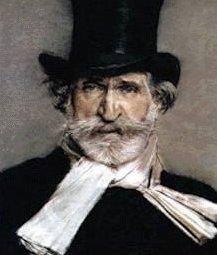
Characteristics:
Opera in three acts on a libretto by Antonio Somma, inspired by the work of Eugené Scribe: Gustave III ou Le bal masqué.
Première: Rome, Apollo Theatre, February 17th, 1859
The story:
Act I.
Riccardo, count of Warwick, English governor of Massachusetts, opens a hearing. Among those present are his enemies, Samuel and Tom, who together with their followers, connive to murder him. Oscar, the page, brings to Riccardo the list of those invited to a ball; on seeing the name of Amelia, whom Riccardo is secretly in love with, he winces. The Creole Renato, secretary and confidant of Riccardo, and Amelia's husband besides, arrives and warns him of a plot against him, but Riccardo takes no heed of the warning. A judge proposes to banish the black Ulrica, accused of witchcraft, but a lenient Riccardo magnanimously proposes to all present to go visit the fortune-teller's hovel. Here Ulrica, who is invoking the "king of the abyss", is questioned by the sailor Silvano to whom she predicts a lucky future. Amid general exultation, the prophecy turns out to be true, since Riccardo had previously slipped money and a nomination of advancement to official into the sailor's pocket. Then one of Amelia's servants comes forward, asking for a private interview for his mistress. The fortune-teller sends all the others out and counsels Amelia, who asks her how she can free herself of a sinful passion, to go to the sinister execution grounds, where she will find an herb of forgetfulness. Riccardo, hidden and listening, is overjoyed to learn that Amelia is in love with him. He disguises himself as a fisherman and goes to the fortune-teller who, however, recognises his hand as that of a noble commander, but refuses to pronounce her prophecy. Finally, at the insistence of Riccardo and the others present, she predicts the death of the count at the hand of a friend, he who is the first to shake his hand. Renato arrives and gives him his hand. Amid the general consternation, Riccardo minimises the affair, while the people extol his virtues.
Act II.
Amelia goes to look for the magic herb and is followed by Riccardo who declares his love for her; Amelia is shaken: she too loves him, but does not want to be unfaithful to her husband. Renato, worried for Riccardo's safety, arrives on the scene and advises Riccardo to leave that solitary spot. Before going, Riccardo entrusts the woman to him (she had covered her face with a heavy veil and has not been recognised by her husband), making him promise that he would not attempt to learn the woman's identity. The conspirators burst onto the scene surprised to find Renato, who tries in vain to protect the woman from their curiosity. In the confusion that follows, Amelia's veil falls. The husband is mortified and angry, and Samuel, Tom and the others comment the event with terrible irony. Upset, Renato makes an appointment to meet Tom and Samuel the next day.
Act III.
Renato is determined to avenge what he presumes to be his wife's infidelity in blood. She asks to be allowed to see their son for the last time. Moved to pity, Renato then decides to satisfy his anger by killing his friend rather than his wife. Samuel and Tom on their arrival are incredulous when they learn of Renato's intentions, but he offers the life of his son as guarantee of his sincerity. The three determine that chance shall decide which of them shall carry out the murder of Riccardo and oblige Amelia to extract a name from the urn: it is Renato. The page Oscar arrives with the invitations for the masked ball. The three agree to take advantage of the occasion to carry out their design, while Amelia tries to think of a way to save the count. Riccardo has decided to renounce his love for Amelia and order their repatriation to England. Oscar brings him an anonymous letter urging him to forego the ball for his own safety, but the count, wanting to see Amelia for the last time, takes no heed of the warning. During the ball, Renato astutely makes Oscar tell him which is the disguise of Riccardo. Meanwhile, Amelia, recognised by Riccardo, implores him to flee and receives his last adieu. He barely has time to finish his dialogue with the woman when he is struck by Renato's dagger. The assassin is arrested, but Riccardo, dying, orders him released. He shows Renato the decree for their repatriation and reveals that Amelia had never been unfaithful. With his dying breath he pardons all the conspirators. All present bless his magnanimity. Renato is left alone with his remorse.
(Giuseppe Verdi)
Sem comentários:
Enviar um comentário